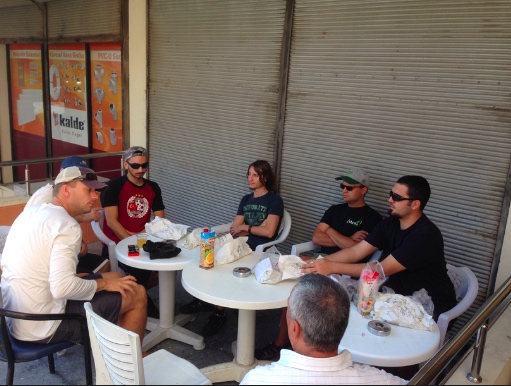When we look at the call of youth ministry, it is easy to feel overwhelmed by the scope of such a calling. Before he ascended to heaven, Jesus called his disciples to, “go into all the world and proclaim the gospel to the whole creation” (Mark 16:15). This is no small task! As Christian leaders, we too have been invited to proclaim the good news of Jesus to the whole of creation. Jesus asks us to think big. But how do we even begin such a giant mission? The only way to understand Jesus’s design for mission is to learn from his perfect example of life on earth.
Category Archives: Green Zone (developing leaders)
Full Spectrum Youth Ministry: The Full Picture Jesus had in Mind for Making Disciples
FULL SPECTRUM YOUTH MINISTRY? WHAT IS THAT?
Joy can be Experienced When Circumstances Stink – Matthew 5: 1-12
The Sermon on the Mount for Teenagers
Two things that every teenager can identify with are a lack of hope and a deep sense of loneliness. Joy is the remedy, but how do you find it?
 LACK OF HOPE
LACK OF HOPE
When classes get hard, school seems totally pointless, friends betray you, you get cut from a team or fail a quiz… all of this can make a teenager feel hopeless. Hope is when a person has reason to believe something good is going to happen to them. Teenagers, because of the roller coaster of emotions and disloyalty among peer relationships, often do not feel like anything good is going to happen to them today, or tomorrow. Because emotions are heightened in adolescence, it is not uncommon for them to either hate or love school, depending on the day or month. This is a normal pattern, but it is not a helpful one. Those of us who really love teenagers can do something to help our teenage friends experience hope even if their circumstances stink.
LONELINESS
Because everyone wants to feel included, teenagers tend to run in small packs. Unfortunately to preserve their sense of belonging they often cut down or make fun of other kids who are not in their group. The devastation of this pattern is insecurity for just about everyone. When a kid cuts someone down or does not show mercy toward someone who messed up, the result is deeper loneliness because everyone intrinsically knows that they are no better than anyone else. Eventually this “pack mentality” catches up with everyone. Each of us will mess up and get made fun of or ridiculed, its just a matter of time.
So how do you break out of this vicious cycle, and maybe help another teenager get free from this joyless trap of loneliness and fleeting hope?
4 Things College & High School Campuses Need
If you are a college student, student ministry leader, or parent of a college student I want you to read this post. College is a window of opportunity. With just a bit of intentionality your college ministry experience could be the difference between a bowl of oatmeal and a Belgian waffle with strawberries and whipping cream. Our college campuses are of course intensely secular places, but there’s really nothing new about that. Followers of Jesus have always been on the outside, a little strange in comparison to the dominant culture. Yet one thing that does seem different today on college campuses is the scale of erosion in the soil of Christian community.
The concern is that without context, it is hard for a young believer to grow and progress in Christ. Without an adequate alternative culture of Jesus-loving friends around you, there is a good chance you will be impacted more by the dominant culture around you, rather than you impacting it. Context to live out our faith is absolutely crucial.
Research Says Great Teams Know How to Assimilate New Team Members
GREAT TEAMS KNOW HOW TO ASSIMILATE NEW TEAM MEMBERS
After reading, would you be willing to share this and offer a comment below? I respond to each comment.
Each semester it is common for a student ministry team to add a new leader or two. It is rare for teams to remain static for too long and it is actually a sign of health in your recruitment and training strategy if you are regularly adding new leaders on your youth ministry or college ministry team. God is constantly at work raising up new laborers for his harvest field so it is really important to have a plan for assimilating new leaders on your team:
When he saw the crowds, he had compassion for them, because they were harassed and helpless, like sheep without a shepherd. Then he said to his disciples, ‘The harvest is plentiful, but the laborers are few; therefore pray earnestly to the Lord of the harvest to send out laborers into his harvest.’ – Matthew 9:36-38).
All of us have been “new” to a team at some point so it should be easy for us to relate. But in reality it takes discipline to keep reminding yourself how others might be feeling like an outsider. It is helpful to step back and put yourself in a new team members shoes. This greatly improves your ability to help them assimilate to your team.
Plurality of Eldership | A Biblical Theology
What Does the Bible Teach about God’s Design for a Plurality of Eldership to Lead the Local Church?
Imagine a group of men of various personalties, ethnicities, and spiritual gifts seeking to lead alongside one another within a relational context of mutual respect and godly commitment for the progress of the gospel in and through a given local church family. This is what the church in Antioch, Syria in the first century possessed, which God used to take His glorious gospel to the far reaches of their known world in the first century (Acts 13:1-3). It is still happening today. The church planting network I am a part of, Crossway Chapel, is committed to this kind of leadership that existed in Antioch.

Meeting with Elders of a Crossway Chapel in Asia
10 Great Questions to Get Your Small Group Talking
TIP: START YOUR SMALL GROUP MEETING WITH A GOOD QUESTION:
- What was your one of your highs and lows from this week?
- What is the something you did this week that you wish you could to do over again?
- When you have some free time, what kinds of things do you like to do?
- If you could change anything about when you were growing up as a kid, what would you change?
- If you could have any job you wanted in the future, what would it be? Why?
- When do you feel most alive or the most “yourself”?
- What is one of the hardest things about being a teenager?
- Can you remember when you first heard about Jesus? What did you think about Him?
- How might you describe your relationship with Jesus these days?
- What is something you really would like to change in your school? Your city?
Tip: If you lead a small group of middle school, high school, or college students I like using the small book, The Personality of Jesus: How to Introduce Young People to Jesus Christ and Help Them Grow in their Faith as a great study to discover Jesus. It has great discussion questions at the end of each short chapter too!
5 Ways You Can Lead a Great Student Ministry Team Meeting
With vision, strategy, and tactics your team will thank you for leading meetings well!
Leading teams requires meetings. Hopefully not too many of them, but you can’t organize movement and growth of a team of people without regular time together to accomplish unity in vision, clarity of strategy, and rehearsal of tactics that will work.
TEAM MEETINGS MUST UNIFY YOUR TEAM ON IT’S VISION
Visionary leaders see clearly where they are going and constantly remind their team, with very simple words and word pictures what that vision is (i.e. a vision statement). If the vision of your team is a bit mirky for the team leader, then you can expect that the vision will be muddy for the rest of your team. By contrast if the team leader has a very clear vision that they talk about all of the time, then they can expect that even if the vision is a bit cloudy their team is still onboard. The Great Commission is a classic example of how Jesus encapsulated his Kingdom vision into a memorable vision statement that has obviously changed the world ever since:
And Jesus came and said to them, ‘All authority in heaven and on earth has been given to me. Go therefore and make disciples of all nations, baptizing them in the name of the Father and of the Son and of the Holy Spirit, teaching them to observe all that I have commanded you. And behold, I am with you always, to the end of the age.’ -Matthew 28:18-2-0
6 WAYS A DURABLE STUDENT MINISTRY BUILDS TRUST
We need more student ministry in North America and around the world, not less. I could blog all day long hundreds of reasons why youth and ministry is increasingly vital, but in this post I want to address those passionate youth leaders out there who either want to pursue a vocation in youth work or student ministry, or those who want to be a durable volunteer in student ministry years to come. I’d like to name a real problem and offer a solution to it. The problem is trust.
We live in a world where trust is eroding. And when trust erodes institutions and cultures weaken. The prosperity of any culture is dependent on how much people trust one another. And since societies can find less and less to agree upon as “normal” you see trust wearing away decade after decade. I’ve oversimplified the problem, but in my view if you want to bring transformation to your city, you need to work on building trust.
Now of course, trust first starts with whether we are trustworthy. No longer do young people trust a teacher just because they are in the “position” of teacher. Even further, just because your organization has a history of trustworthiness, this no longer acts as a filter for people to trust the individuals who work with/for that organization. And unfortunately this trend is even beginning to be imposed on the church. This may seem overwhelming, but the good news is that trust is rebuilt one person at a time. And you are a vital stepping stone to revitalizing the foundation of “trust” in your neighborhood, city, etc.
Jesus Loved Outcasts | PALS 15 Minute Devotional: Mark 2:13-17
Jesus loved to hang out with outcasts. Here’s a PALS 15 Minute Devotional on Mark 2:13-17 that will help your small group of students notice others around them who are hurting. This devo will challenge your small group to do something obvious and counter cultural in your school to impact kids who may feel alone or unliked…






